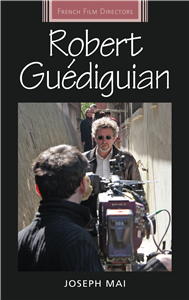Robert Guédiguian
by Joseph Mai
Description
More Information
Rights Information
Albania, Algeria, Angola, Argentina, Armenia, Australia, Austria, Bahrain, Belgium, Belize, Benin, Bolivia, Bosnia and Herzegovina, Botswana, Brazil, Bulgaria, Burkina Faso, Burundi, Cameroon, Canada, Cape Verde, Central African Republic, Chad, Chile, China, Colombia, Comoros, Congo [DRC], Congo, Republic of the, Costa Rica, Ivory Coast, Croatia, Czech Republic, Denmark, Djibouti, Ecuador, Egypt, El Salvador, Equatorial Guinea, Eritrea, Estonia, Ethiopia, Faroe Islands, Finland, France, French Guiana, Gabon, Gambia, Georgia, Germany, Ghana, Greece, Guatemala, Guinea, Guinea-Bissau, Guyana, Honduras, Hongkong, Hungary, Iceland, India, Indonesia, Iran, Iraq, Ireland, Israel, Italy, Japan, Jordan, Kazakhstan, Kenya, Kuwait, Latvia, Lebanon, Lesotho, Liberia, Libya, Lithuania, Luxembourg, Macau, China, Macedonia [FYROM], Madagascar, Malawi, Malaysia, Mali, Malta, Mauritania, Mauritius, Mayotte, Mexico, Mongolia, Montenegro, Morocco, Mozambique, Namibia, Netherlands, New Zealand, Nicaragua, Niger, Nigeria, Norway, Oman, Pakistan, Panama, Paraguay, Peru, Philippines, Poland, Portugal, Puerto Rico, Qatar, Reunion, Romania, Russia, Rwanda, Saint Helena, Sao Tome and Principe, Saudi Arabia, Senegal, Serbia, Seychelles, Sierra Leone, Singapore, Slovakia, Slovenia, Somalia, South Africa, South Korea, Spain, Sri Lanka, Sudan, Suriname, Swaziland, Sweden, Switzerland, Syria, Taiwan, Tanzania, Thailand, Timor-Leste, Togo, Tokelau, Tunisia, Turkey, Uganda, Ukraine, United Arab Emirates, United Kingdom, United States, Uruguay, Venezuela, Vietnam, Western Sahara, Yemen, Zambia, Zimbabwe, South Sudan, Cyprus, Palestine, Bangladesh, Cambodia, Liechtenstein, Azerbaijan
Endorsements
Intervening at the crossroads of philosophy, politics, and cinema,this book argues that the career of Robert Guédiguian, director of Marius et Jeannette (1997) and other eminently popular auteurist films, is the result of one of the most subtly original and coherent projects in contemporary French cinema: to make a committed, historically-conscious cinema, in a local space, over a long period of time, but most importantly with a small number of close friends. The account starts with a nuanced consideration of friendship and its relation to political action and moral philosophy (including the themes of time, space, and human flourishing). Taking a chronological organisation, the book then traces Guédiguian's project from its beginning in his hometown, the communist-leaning Estaque neighborhood of Marseilles. Individual chapters explore Guédiguian's rousing but pessimistic experiments with popular form during political upheaval in the 1980s left; his deep and exhilarating advocacy of local activism and utopias in the 1990s; and finally his varied explorations of genre and register, politics and ethics, in more recent work. In the Conclusion, close filmic analysis and historical contextualisation give way to a portrait of the unique, determined, long-term project of friendship that defines both Guédiguian's cinema and his life.
Reviews
Intervening at the crossroads of philosophy, politics, and cinema,this book argues that the career of Robert Guédiguian, director of Marius et Jeannette (1997) and other eminently popular auteurist films, is the result of one of the most subtly original and coherent projects in contemporary French cinema: to make a committed, historically-conscious cinema, in a local space, over a long period of time, but most importantly with a small number of close friends. The account starts with a nuanced consideration of friendship and its relation to political action and moral philosophy (including the themes of time, space, and human flourishing). Taking a chronological organisation, the book then traces Guédiguian's project from its beginning in his hometown, the communist-leaning Estaque neighborhood of Marseilles. Individual chapters explore Guédiguian's rousing but pessimistic experiments with popular form during political upheaval in the 1980s left; his deep and exhilarating advocacy of local activism and utopias in the 1990s; and finally his varied explorations of genre and register, politics and ethics, in more recent work. In the Conclusion, close filmic analysis and historical contextualisation give way to a portrait of the unique, determined, long-term project of friendship that defines both Guédiguian's cinema and his life.
Author Biography
Joseph Mai is Professor of French at Clemson University
Manchester University Press
Manchester University Press is a leading UK publisher known for excellent research in the humanities and social sciences.
View all titlesBibliographic Information
- Publisher Manchester University Press
- Publication Date August 2022
- Orginal LanguageEnglish
- ISBN/Identifier 9781526163974 / 1526163977
- Publication Country or regionUnited Kingdom
- FormatPrint PDF
- Pages168
- ReadershipGeneral/trade
- Publish StatusPublished
- Dimensions198 X 129 mm
- Biblio NotesDerived from Proprietary 2730
- SeriesFrench Film Directors Series
- Reference Code14720
Manchester University Press has chosen to review this offer before it proceeds.
You will receive an email update that will bring you back to complete the process.
You can also check the status in the My Offers area

Please wait while the payment is being prepared.
Do not close this window.



